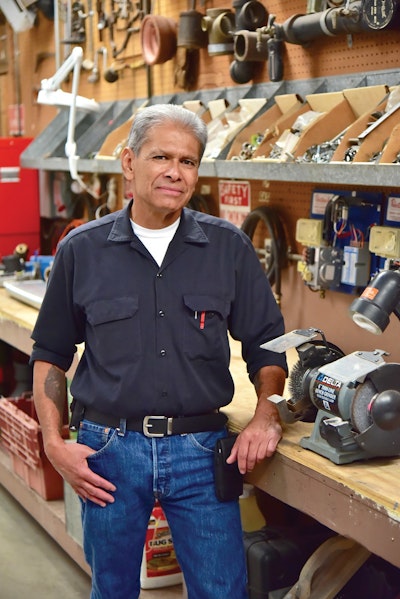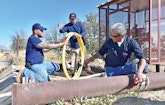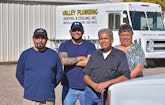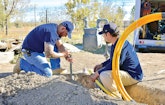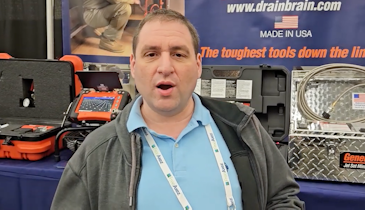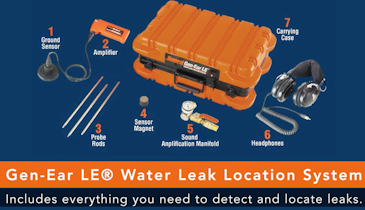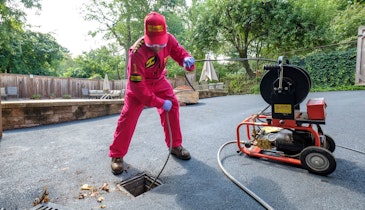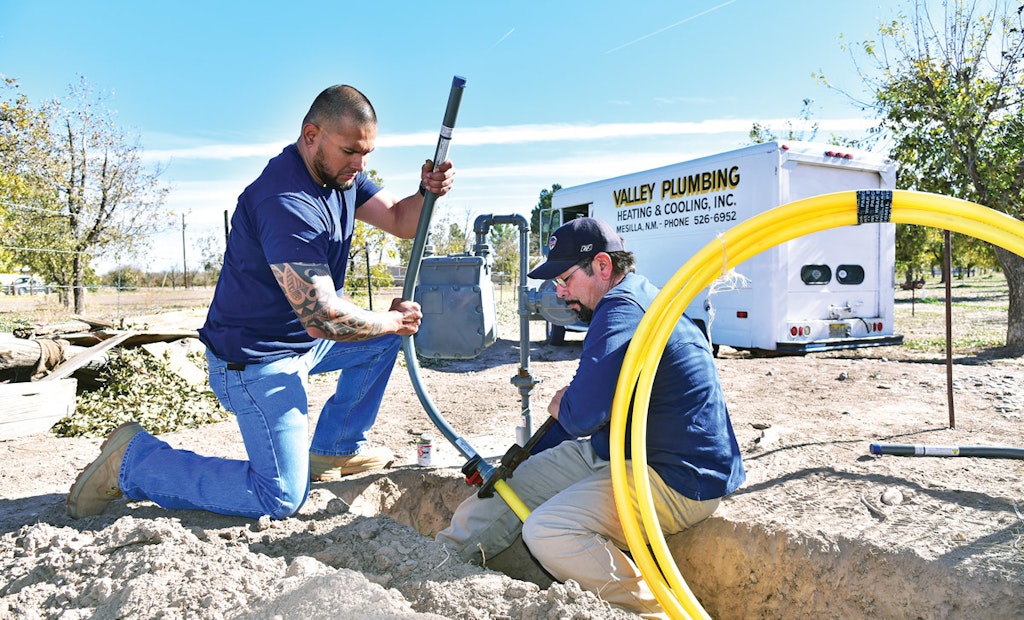
Jake Johnson rolls out the poly gas tubing after he and David Peña connect it to an iron pipe game riser on a job site.
For a classic American business success story, look no further than Valley Plumbing, Heating & Cooling in Mesilla, New Mexico.
The late Raul Peña, who came from a family of farm laborers, founded the company back in 1963. He was equipped with little more than utilities experience gleaned from a stint in the U.S. Army (which included serving in the Korean War), a mechanical contractor’s license, basic tools and a boundless work ethic.
Peña also had a steadfast partner — his wife, Beatrice, whom he married in 1953 — as well as a strong desire to ply a trade instead of farming.
Nearly six decades later, his son, Steve, owns the company and carries on his parents’ legacy: passionately and compassionately providing essential home services in and around Mesilla, located on the southwest outskirts of Las Cruces in the Mesilla Valley.
“When my father started out, he would do everything and anything, from service and repair work to new construction,” Peña says. “He used our kitchen as an office, the kitchen table as his desk and a small detached garage as his shop. Very humble beginnings.
“Eventually he started to hire employees,” he continues. “I remember that at one time he had 15 employees punching a time clock. But some of them were temporary; he usually had about five full-time employees.”
Why did he choose plumbing as a career? “He joined the Army at age 17 and the skills he developed there and later on while working for a propane company were a good fit,” Peña explains. “He loved mechanical work.”
The elder Peña wanted to call the company Mesilla Plumbing. But the name already was taken, so he named it Valley Plumbing, a nod to the valley in which the town lies. The other plumbing company no longer exists. But Valley Plumbing is still going strong.
Steve Peña joined the company in 1976, after serving in the U.S. Navy for three years after graduating from high school. “I felt fortunate to come home to a full-time job,” he recalls. “But I had to prove myself to my parents.
“That took a few years because I made my share of mistakes, like any other rookie,” he notes. “But I eventually proved myself, there was no privilege or entitlement in their book.”
Raul Peña died in 2007 and Steve, now 66 years old, took official ownership of the company in 2012, after his mother passed away.
BUSINESS BASICS
Peña runs the business with the same old-school mentality embraced by his father. For marketing, there’s no website or social media; he relies instead on time-honored basics such as word-of-mouth referrals and the company’s strong reputation for integrity and workmanship.
The old-school philosophy extends to vehicles and machines. Take the company’s smartly lettered 1987 and 1993 Chevrolet step vans, with 110,000 and 130,000 miles on the odometers, respectively, and still going strong, thanks to meticulous maintenance.
“They’re great vehicles,” he says. “You can fit all kinds of stuff in them — you name it, we can carry it. Plus you can stand up inside them.
“There used to be a dealer here in town that had them for sale all the time,” he adds. “We take real good care of them, do the regular oil changes and lube jobs. They’re very reliable, they just work for us.”
Each truck carries three drain machines made by Spartan Tool: a 1065 model (made for 3- to 10-inch diameter drainlines), a 100 model (designed for 1 1/2- to 4-inch lines) and a smaller model 81 (for bathtub, shower and sink drains). The machines were purchased around 1985 and still run great.
“They’re great machines, lot of torque in those motors,” Peña says.
OLDIES BUT GOODIES
The company also still relies on a Spartan 737 trailer-mounted water jetter that Peña’s father bought in 1985. It features a 53-gallon water tank, 164 feet of ¾-inch-diameter hose and water pump that generates 1,000 psi of pressure.
“It was one of the first trailer jetters in Doña Ana County,” says Peña. “A Spartan rep brought it over for a demonstration and we took it to a restaurant and cleaned a clogged sewer line. We used to work with a lot of restaurants back in the day, cleaning grease blockages.
“Man, we liked that machine — Dad bought it right then and there for around $5,000,” he adds. “If we can’t unclog a line with one of our cable machines, we still use the jetter, either on sewer lines or septic system drainfields.”
Regular maintenance protocols are critical to keeping older machines running. When business is slower, technician Jake Johnson, Peña’s right-hand man who’s been with the company for more than 25 years, takes the machines apart and then cleans and lubricates them.
“That helps to keep them running,” Peña says. “I’m okay with using older tools. With our equipment and our experience, we get the jobs done. I appreciate new technology, but I appreciate the old school, too.”
The company also owns a Chaser push camera and monitor for inspecting drainlines, made by UEMSI/HTV; an acoustic leak-detection system from Vivax-Metrotech; and a Model 845-5 backflow test kit manufactured by Mid-West Instrument.
The company also invests in power tools made by Milwaukee Tool, RIDGID and Hilti.
COMPLEX JOB
Peña recalls the days years ago when the company’s services were quite different. As an example, he points to a complex project performed nearly 30 years ago for a local chile farmer who, in conjunction with chile farmers in Mexico, built a chile-dehydrating plant in the city of Camargo, in the Mexican state of Chihuahua.
“They were building a plant to dry the chiles and process them,” he explains. Peña flew to Camargo to take measurements for all the 2-inch, black-iron pipes and flexible polyethylene underground pipes that would supply propane gas to the burners used to heat the chiles.
Then Peña pre-fabricated and tested everything in his shop, including testing the gas burners. After all the components were delivered via a semi-trailer, Peña went back to Camargo to install it all, which took about three days.
“It was a very challenging job,” he says. “One of my helpers and I drove down there and put it all together. Then they fired it up and tested it out. It all worked great — and that farmer still is one of our clients.”
ADAPTING TO CHANGES
As competition increased for installing new-construction plumbing, Peña slowly withdrew from that sector. As a result, the company eventually sold its trenching machines and excavators and downsized to the four employees on board today: Peña; Johnson; Peña’s son, David, an apprentice; and office manager Veronica Garcia, also Peña’s cousin.
“I wanted less stress, so we decided to concentrate on service repair which has always been our niche — our bread and butter,” he explains. “We have very loyal customers that keep us going.”
The difficulty in finding quality employees also influenced Peña’s decision to downsize. Too many “bad apples” led to subpar work and profit killing callbacks, he notes.
Speaking of callbacks, Peña says part of the company’s success stems from one of many lessons he learned from his father: Always take ownership of errors and make things right with customers.
“We want to make sure clients get a good quality job every time,” he says. “But we’re not infallible and I will never claim to be. So when screwups happen, we remedy them right away, even if we lose money on the job.
“I’ve learned over the years to just say, ‘We screwed up and we will make it right,’” he adds. “And we do.”
Peña also says quality workmanship has contributed greatly to the company’s success and longevity.
“I’m a perfectionist, which I learned from my father, who was very demanding and hard on me,” he explains. “Our finished product better look good. Even if it’s covered by Sheetrock, it has to look professional. Period.
“And it better be level, whether horizontal or vertical, and properly anchored with clamps,” he continues. “We also coat iron gas fittings with oil, or the rust comes through right away. And if we put Mastic around a flue pipe (to seal the flashing), I don’t want it splashed on, I want a nice, straight edge.”
END OF THE LINE?
Does Valley Plumbing embody the American dream? “Amen,” Peña says. “My father started with nothing and my mom cleaned houses until she became his secretary. They worked together and built a company.
“He was very driven,” Peña adds. “All he knew was hard work. And all he wanted was to be successful.”
As much as Peña hates the idea, Valley Plumbing most likely will not continue on after he retires. He says he’s accepted this fact and knows there will come a day when it’s time to let a next generation of plumbers — including Johnson and his son, Zach — to make their mark with new companies.
“The business will end with me,” he says. “As far as when that happens, I can’t say for sure. All I know is that at the moment, by the grace of God, we’re surviving and paying our vendors every month and paying ourselves every month. So we just take it one day at a time.”
